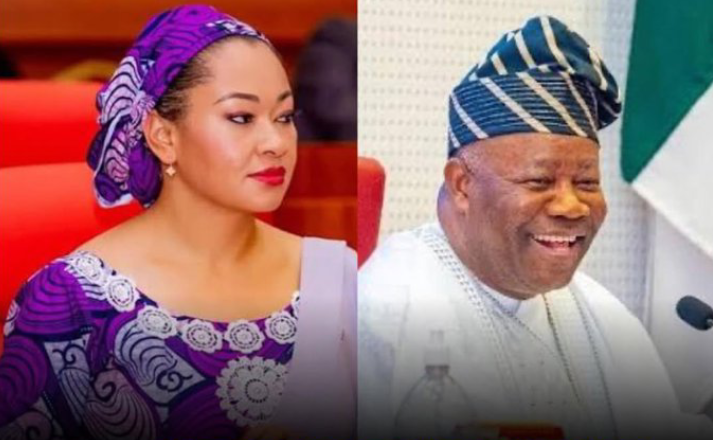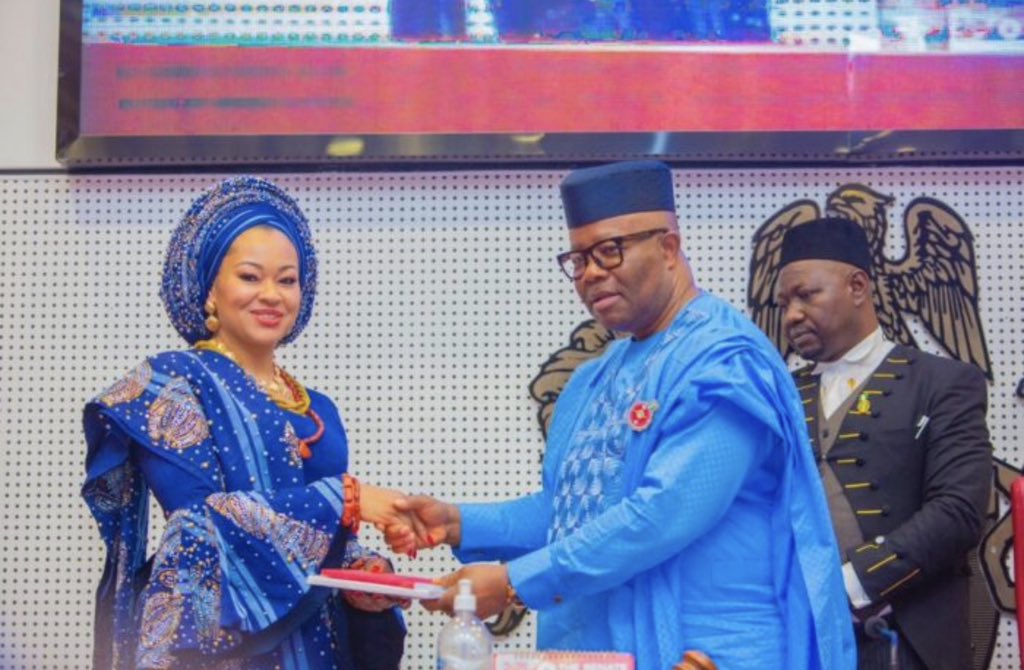
Senator Natasha Extends Olive Branch: Invites Akpabio to Kogi Project Commissioning as Rift Appears to Thaw

In what many political observers are describing as a rare moment of reconciliation and maturity in Nigeria’s often heated political space, Senator Natasha Akpoti-Uduaghan of Kogi Central has extended an invitation to Senate President Godswill Akpabio and other senators to attend the commissioning of several completed constituency projects in her district. The event, slated for Sunday in Ihima, Kogi State, marks not just a celebration of infrastructure development but also a symbolic gesture that may signal the easing of tensions between the outspoken Kogi lawmaker and the Senate leadership.
Senator Akpoti-Uduaghan, who has been known for her fearless advocacy and vocal stance on issues of governance, transparency, and accountability, made the invitation public earlier in the week, generating a wave of reactions across political circles. The senator, a member of the Peoples Democratic Party (PDP), has had her fair share of disagreements with the Senate leadership dominated by the ruling All Progressives Congress (APC). Her cordial invitation to Senate President Akpabio — a key figure of the APC — has therefore been interpreted by many as a sign of political maturity and a willingness to place national interest above personal or partisan differences.
The upcoming commissioning in Ihima is expected to showcase a series of development projects executed under Senator Natasha’s watch since assuming office. Sources close to her office revealed that the projects cut across key sectors such as education, healthcare, water supply, rural electrification, and empowerment initiatives for women and youth — all designed to improve the living conditions of her constituents in Kogi Central. For residents of Ihima and the surrounding areas, the commissioning represents a tangible return on democratic governance and a moment of pride for the community that has long yearned for inclusion and progress.
Political analysts are viewing Natasha’s invitation to Akpabio through a broader lens, suggesting that it could mark a turning point in what has at times been a frosty relationship between her and the Senate leadership. Earlier in her tenure, Senator Akpoti-Uduaghan had been outspoken about procedural irregularities and issues of transparency within the legislative process. She had also raised concerns about the allocation of committee positions and the treatment of opposition voices in the National Assembly. While these concerns earned her praise from sections of the public, they also reportedly strained her relationship with some top figures in the Senate.
However, her decision to openly invite Senate President Akpabio appears to reflect a renewed commitment to cooperation and legislative unity. In Nigerian politics, where grudges often linger and partisanship can easily overshadow progress, Natasha’s move could be seen as both strategic and symbolic — a demonstration that dialogue and collaboration remain possible despite political differences.
In Ihima, preparations are reportedly in full swing for the Sunday event, which is expected to draw dignitaries from across the political spectrum. Locals say banners have gone up, roads are being cleared, and excitement is building ahead of the high-profile visit. Community leaders have described Senator Natasha’s achievements as “unprecedented,” noting that many of the projects being commissioned are the first of their kind in the area. “We’ve never had a senator so close to the people,” said a traditional leader from Adavi. “What she has done in less than two years is what others could not achieve in eight.”
The choice of Ihima for the commissioning is also significant. The town, known for its vibrant culture and political awareness, has often been at the center of calls for more equitable development in Kogi State. By bringing the Senate leadership to Ihima, Natasha not only highlights her projects but also puts Kogi Central on the national map in a positive light.
Political watchers believe the presence of Akpabio, if he attends, would send a powerful message of unity within the 10th Senate. It would also show that the legislature can rise above partisanship in the interest of the Nigerian people. A senior legislative aide who spoke under anonymity remarked, “If the Senate President attends the commissioning, it would be a big statement. It means politics can give way to partnership when the goal is public service.”
This development also comes at a time when Senator Natasha’s influence within the National Assembly appears to be growing. Her speeches on gender equality, social justice, and youth empowerment have earned her widespread recognition both within and outside the Senate chamber. Her dedication to constituency development has further strengthened her image as a lawmaker committed to service delivery, rather than just political rhetoric.
Observers note that the senator’s approach reflects a blend of assertiveness and diplomacy — a combination that may redefine her political journey. By extending an olive branch to the Senate leadership, she demonstrates an understanding that progress in governance often requires collaboration rather than confrontation. At a time when Nigeria is grappling with economic and social challenges, such examples of bipartisan engagement could serve as an inspiration for others in public office.
Meanwhile, reactions to her invitation on social media have been mixed but largely positive. Many Nigerians commended the senator for putting differences aside and focusing on development. “This is the kind of leadership we want — results, not rancor,” one user wrote. Another commented, “Natasha is setting an example for both male and female politicians. She’s showing that politics doesn’t have to be toxic.” Some, however, expressed skepticism, suggesting that political reconciliation might come with hidden motives or future alliances ahead of the next election cycle.
Regardless of the interpretations, the symbolism of the invitation cannot be understated. It reflects a rare tone of civility in an increasingly polarized political climate and hints at the possibility of a more cooperative relationship between the opposition and the ruling party within the Senate. For Senator Natasha, it may also be a strategic step toward securing broader support for future legislative initiatives and constituency development programs.
As the commissioning day draws near, all eyes are on Ihima to see whether Akpabio will indeed honor the invitation. His presence could reinforce the image of a Senate united in service to the people, while his absence might reignite speculations of an underlying rift. Either way, the gesture by Senator Natasha Akpoti-Uduaghan has already achieved one important outcome — it has opened the door for dialogue, showing that bridges can be rebuilt even in the most divided political environments.
In a country where public office is often defined by rivalry and partisanship, Natasha’s move stands out as a refreshing reminder of what politics should truly represent — service, unity, and progress. Whether or not Akpabio’s convoy rolls into Ihima on Sunday, one thing is clear: the senator from Kogi Central has managed to shift the conversation from conflict to cooperation, proving that leadership, at its core, is about the courage to extend a hand even when it once seemed impossible.

